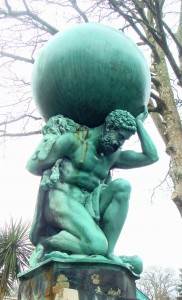Atlas was the son of Titan Iapetus and the Oceanid Clymene (who was also referred to as “Asia”) in Greek mythology and he was the brother of Titans Epimetheus, Menoetius and Prometheus.
Atlas was mostly known in the mythology as “the Titan who held the world upon his shoulders”. But “the world” would not be accurate as the he was punished by Zeus to hold the celestial sphere on his shoulders until the end of time. The story behind this begins with Atlas’ conflict with Zeus. It is told in the myths that Atlas was one of the Titans who fought beside Cronus during the war between Titans and Gods, unlike his brother Prometheus. It is even written in some accounts that Atlas led the Titans during Titanomachy since Cronus was too perform this task. After the war ended in favor of Zeus and the Gods, Atlas was punished by Zeus to hold up the celestial sphere.
Since America continent was not discovered at the time, Greeks in the ancient age believed that Atlas held the world upon his shoulders at the westernmost end of the world and they named the ocean beside that location after him as “the Atlantic Ocean”.
Atlas, Titan God of Astronomy
Atlas is also known as the god of astronomy since he was believed to have taught mankind about the science. By teaching them about the science of the stars, he helped sailors to navigate better and farmers to make better calculations about seasons.
Hercules’ Encounter with Atlas
In addition to ten original tasks he completed Hercules was given two more tasks by Eurystheus, who suggested Hercules cheated while fulfilling some of these tasks.
First additional task Hercules was given was about stealing the apples from the Garden of Hesperides, the nymphs who were believed to be Atlas’ daughters.
 Hercules did not even know where the Garden of Hesperides was when he started his journey and he wandered blindly around Arabia, Libya, Egypt and Asia until he met Prometheus on Mount Caucasus, who was chained to the mountain as a punishment for helping mankind.
Hercules did not even know where the Garden of Hesperides was when he started his journey and he wandered blindly around Arabia, Libya, Egypt and Asia until he met Prometheus on Mount Caucasus, who was chained to the mountain as a punishment for helping mankind.
Hercules helped Prometheus by killing the eagle that came every day to eat a piece of Prometheus’ liver and the Titan returned the favor by telling Hercules how he could get the apples of Hesperides. Prometheus told Hercules he should send Atlas to get the apples. Hercules found Atlas and told him he could hold Atlas’ burden for some time if Atlas could get some apples from the Garden of Hesperides.
Atlas, who was very upset about holding the world and the heavens on his shoulders for a long time, gladly accepted the offer and went to bring some apples to Hercules. However, when Atlas came back he told Hercules that he did not want to take the burden on his shoulders again and he would be the one to take the apples to Eurystheus instead of Hercules. As a part of his trick to fool Atlas, Hercules seemed as if he was okay with what Atlas told him. He told Atlas that he wanted to put on some shoulder pads since he would be the one to carry the burden of the world on his shoulders. Atlas lifted the world upon his shoulders again thinking it would be only temporary but Hercules ran away with the apples as soon as Atlas took over his everlasting burden.
On a side note, it is mentioned in some versions of the myth regarding the Eleventh Labor of Hercules that Hercules, indeed, relieved Atlas from his burden by forming/building two pillars, namely the Pillars of Hercules, to carry the world and the heavens. One of these pillars was believed to be the Rock of Gibraltar at the Strait of Gibraltar whereas there were some disputes throughout the history regarding the other one, particularly about whether it was Jebel Musa (Mount Moses) in Morocco or Monte Hacho in Spain.
Perseus and Atlas
Another myth related to Atlas involves the great Greek hero, Perseus. According to story, Perseus encountered Atlas while he was on his way back home from his quest of slaying the Gorgon Medusa. He asked for Atlas’ help and sought shelter for some time. However, Atlas refused Perseus’ wish ending in Perseus using the head of Gorgon Medusa to turn Atlas into a rocky mountain, more precisely, a range of rocky mountains known today as the Atlas Mountains in North-western Africa.
Titan Atlas is known by the same name in Roman mythology and he is mostly depicted in the art while carrying the world upon his shoulders as his punishment.

